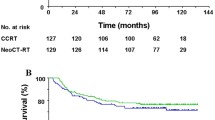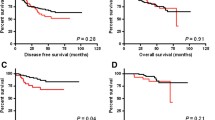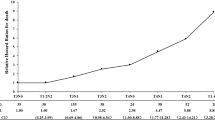Abstract
Objective
The aim of the study was to investigate the clinical effects of concurrent radiochemotherapy in treating locally advanced (Stages III–IVa) nasopharyngeal carcinomas (NPCs).
Methods
A total of 95 patients who suffered from nasopharyngeal carcinoma (Stages III–IVa) was divided into two groups: Group concurrent radiochemotherapy (Group CCRT, n = 49) and Group radiotherapy (Group RT, n = 46). The two groups were both delivered conventional fractionated radiotherapy, while Group CCRT was delivered three cycles chemotherapy of PF (DDP + 5-Fu) regimen or PLF (DDP + 5-Fu + CF) regimen.
Results
The complete remission rate and total remission rate of Group CCRT were higher than those of Group RT, and the differences were of statistical importance (χ2 = 4.72–7.19, P < 0.05). The one-year overall survival (OS) rate was calculated by life table method, in Group CCRT, it was higher than that of Group RT and the difference was of statistical importance (χ2 = 4.24, P š 0.05). The 3-year overall survival (OS) rate, nasopharyngeal control rate and cervical lymph nodes’ control rate of Group CCRT were all higher than those of Group RT and the differences were of statistical importance (χ2 = 4.28–4.40, P < 0.05). The 5-year overall survival (OS) rate and metastasis-free rate of Group CCRT were higher than those of Group RT and the differences were of statistical importance (χ2 = 3.96–8.26, P < 0.05). The incidence rates of acute toxicities in Group CCRT were obviously higher than those in Group RT, and the difference of gastrointestinal reaction was of statistical importance (χ2 = 11.70, P < 0.05).
Conclusion
This study has demonstrated that concurrent radiochemotherapy can improve the remission rate, overall survival rate and locally control rate. The toxicities of concurrent radiochemotherapy can be tolerated by the patients.
Similar content being viewed by others
References
Cheng SH, Tsai SY, Yen KL, et al. Concomitant radiotherapy and chemotherapy for early-stage nasopharyngeal carcinoma. J Clin Oncol, 2000, 18: 2040–2045.
Shen WJ, Wang LH. Radiation induced injury. Beijing: Chinese Medical Science and Technology Press, 2001. 257–259.
Baujat B, Audry H, Bourhis J, et al. Chemotherapy in locally advanced nasopharyngeal carcinoma: an individual patient data meta-analysis of eight randomized trials and 1753 patients. Int J Radiat Oncol Biol Phys, 2006, 64: 47–56.
Hui EP, Ma BB, Leung SF, et al. Randomized phase II trial of concurrent cisplatin-radiotherapy with or without neoadjuvant docetaxel and cisplatin in advanced nasopharyngeal carcinoma. J Clin Oncol, 2009, 27: 242–249.
Hu D, Cao CJ, Xie GF, et al. Comparison of effectiveness for nasopharyngeal carcinoma treated with inducing chemotherapy plus radiotherapy versus concurrent radio-chemotherapy. Bull Chin Cancer (Chinese), 2007, 16: 263–266.
Huang PY, Mai HQ, Luo DH, et al. Induction-concurrent chemoradiotherapy versus induction chemotherapy and radiotherapy for locoregionally advanced nasopharyngeal carcinoma. Cancer, 2009, 28: 1033–1042.
Lee N, Xia P, Quivey JM, et al. Intensity-modulated radiotherapy in the treatment of nasopharyngeal carcinoma: an update of the UCSF experience. Int J Radiat Oncol Biol Phys, 2002, 53: 12–22.
Sun Y. Medical oncology. Beijing: People’s Medical Press, 2003. 432–433.
Lin JC, Jan JS, Hsu CY, et al. Phase III study of concurrent chemoradiotherapy versus radiotherapy alone for advanced nasopharyngeal carcinoma: positive effect on overall and progression-free survival. J Clin Oncol, 2003, 21: 631–637.
Lee AW, Tung SY, Chan AT, et al. Preliminary results of a randomized study (NPC-9902 Trial) on therapeutic gain by concurrent chemotherapy and/or accelerated fractionation for locally advanced nasopharyngeal carcinoma. Int J Badiat Oncol Biol Phys, 2006, 66: 142–151.
Yang AK, Liu TR, Guo X, et al. Concurrent chemoradiotherapy versus radiotherapy alone for locoregionally advanced nasopharyngeal carcinoma: a meta-analysis. Chin J Otorhinolaryng Head Neck Surg (Chinese), 2008, 43: 218–223.
Gu XZ, Yin WB, Yu ZH, et al. Cancer radiotherapeutics. Fourth Edition. Beijing: China Union Medical University Press, 2008. 477–478.
Author information
Authors and Affiliations
Corresponding author
Rights and permissions
About this article
Cite this article
Yu, H., Zhang, W. & Yu, L. The clinical effects of concurrent radiochemotherapy in cases suffered from stages III to IVa nasopharyngeal carcinoma. Chin. -Ger. J. Clin. Oncol. 10, 683–686 (2011). https://doi.org/10.1007/s10330-011-0878-4
Received:
Revised:
Accepted:
Published:
Issue Date:
DOI: https://doi.org/10.1007/s10330-011-0878-4




